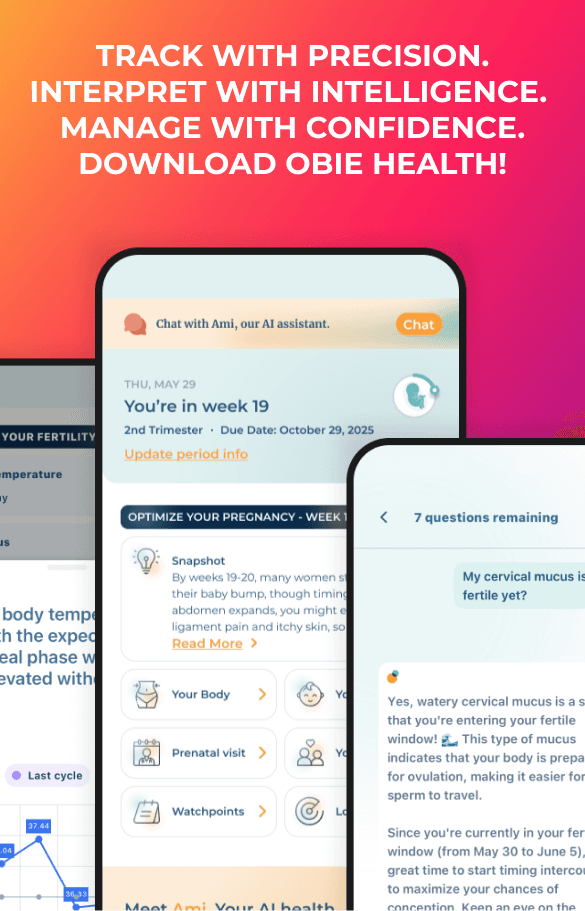Temporary Suppression of Immunity during Ovulation—and What That Means for Your Health
Obie Editorial Team

Many people don’t realize that the immune system doesn’t operate in isolation—it’s in constant conversation with your reproductive hormones. Each phase of the menstrual cycle subtly shifts how your immune system works, influencing how your body handles infections, inflammation, and even chronic illnesses. One especially fascinating example is what happens around ovulation: during this fertile window, your immune system dials down specific defenses to give sperm a better chance of survival.
This immune “pause” is intentional, elegant, and essential for reproduction but also comes with trade-offs.
Why Does the Immune System Suppress Itself During Ovulation?
Ovulation is the midpoint of your cycle, when an egg is released and the body prepares for potential fertilization. At this time, your immune system does something counterintuitive: it lowers certain defenses, especially in the mucosal lining of the reproductive tract.
The reason? If your immune system treated sperm like foreign invaders, fertilization would be almost impossible. To avoid this, the body temporarily suppresses mucosal immunity in the reproductive tract. This includes reduced activity of immune cells and fewer inflammatory responses in the cervix and uterus. It’s a clever evolutionary adaptation that improves reproductive success, but it can leave you slightly more vulnerable to infections, especially sexually transmitted infections (STIs).
This phenomenon is well-documented in reproductive immunology research. According to a pivotal study published in the American Journal of Reproductive Immunology, “mucosal immune protection is reduced at midcycle to optimize conditions for fertilization and pregnancy” (Wira et al., 2014). Researchers observed a coordinated downregulation of immune responses, particularly around ovulation, to prevent the immune system from attacking sperm.
What Does This Mean for Your Health?
If you're wondering whether this shift makes a real-world difference—yes, it can. The body is constantly balancing protection with reproduction, and during ovulation, that balance tips in favor of fertility.
Here’s how that might affect you:
- Increased susceptibility to STIs: Reduced mucosal defenses during ovulation make the reproductive tract more vulnerable to pathogens.
- Heightened risk for vaginal infections: Yeast infections and bacterial vaginosis may be more likely if the vaginal microbiome is disrupted during this time.
- Potential flares in chronic conditions: Some autoimmune or inflammatory symptoms may worsen or become more noticeable during certain cycle phases, though the relationship is complex.
- Hormonal shifts and overall immunity: Estrogen and progesterone also impact immune cells throughout the body, not just in the reproductive tract, which can influence how you feel, how you recover from illness, and even how you respond to vaccines.
How to Support Your Immune System Across Your Cycle
Understanding how your immune system changes with your cycle empowers you to be proactive. While ovulation-related immune suppression is normal and necessary, there are still practical steps you can take to stay well:
- Stay hydrated and prioritize whole foods that support gut and immune health.
- Use barrier protection, especially during your fertile window, to reduce STI risk.
- Keep track of your cycle with an app like Obie to anticipate when you might feel more vulnerable.
- Support your microbiome with fermented foods or probiotics, especially if you’re prone to infections.
- Avoid douching or using harsh soaps, which can disrupt natural mucosal defenses.
- Talk to your healthcare provider if you have an autoimmune condition that seems to flare with your cycle.
Takeaway
Your menstrual cycle is more than just a reproductive rhythm—it’s a full-body signal that affects immune strength, inflammation, and vulnerability. Ovulation is a particularly unique window when your body prioritizes fertility over immune defense, which may explain subtle shifts in your health during the month. By tuning into these changes, you can make smarter decisions to support your immune health at every stage.
Source:
Wira CR, Fahey JV, Rodriguez-Garcia M, Shen Z, Patel MV. Regulation of mucosal immunity in the female reproductive tract: the role of sex hormones in immune protection against sexually transmitted pathogens. Am J Reprod Immunol. 2014 Aug;72(2):236-58. doi: 10.1111/aji.12252. Epub 2014 Apr 16. PMID: 24734774; PMCID: PMC4351777.







